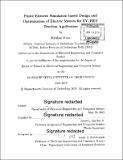Finite element simulation based design and optimization of electric motors for EV/HEV traction application
Author(s)
Kant, Krishan(Electrical and computer science engineer)Massachusetts Institute of Technology.
Download1122565700-MIT.pdf (17.73Mb)
Other Contributors
Massachusetts Institute of Technology. Department of Electrical Engineering and Computer Science.
Advisor
James L. Kirtley Jr.
Terms of use
Metadata
Show full item recordAbstract
The launch of so many commercial electric vehicles shows the effort toward pollution reduction and curtailing greenhouse gas emissions. A design for an electric vehicle does not just requires the electrical system to be efficient in particular; but it is required to perform in all extreme cases of thermal and mechanical stresses. And it is made possible by all the research and development in all the areas of electrical machines, power electronics and energy storage that electric vehicle systems can meet very challenging specifications. With the availability of reliable simulation tools, a lot of time and money can be saved in the designing process. Accurate simulation tools tends to be more time consuming. There are simplification methods that save time, but at the cost of some fidelity. Moreover, design is an iterative process and optimization of design based on some specific requirement multiplies the amount of computation and hence time consumption. This thesis deals with the design and optimization of permanent magnet based traction motors with given dimensions and drive constraints. The goal is to develop a method which has the accuracy of finite element method but with much smaller time consumption for designing and optimizing the motor. Since it is a traction motor, the optimization is carried for a specific load pattern of driving a car, called a drive cycle. The program developed is tested on various types of permanent magnet motors to verify the generality of the program. For the motor topologies that cannot achieve a particular specifications, the program specifies the maximum capability of the motor.
Description
Thesis: S.M., Massachusetts Institute of Technology, Department of Electrical Engineering and Computer Science, 2019 Cataloged from PDF version of thesis. Includes bibliographical references (pages 125-129).
Date issued
2019Department
Massachusetts Institute of Technology. Department of Electrical Engineering and Computer SciencePublisher
Massachusetts Institute of Technology
Keywords
Electrical Engineering and Computer Science.